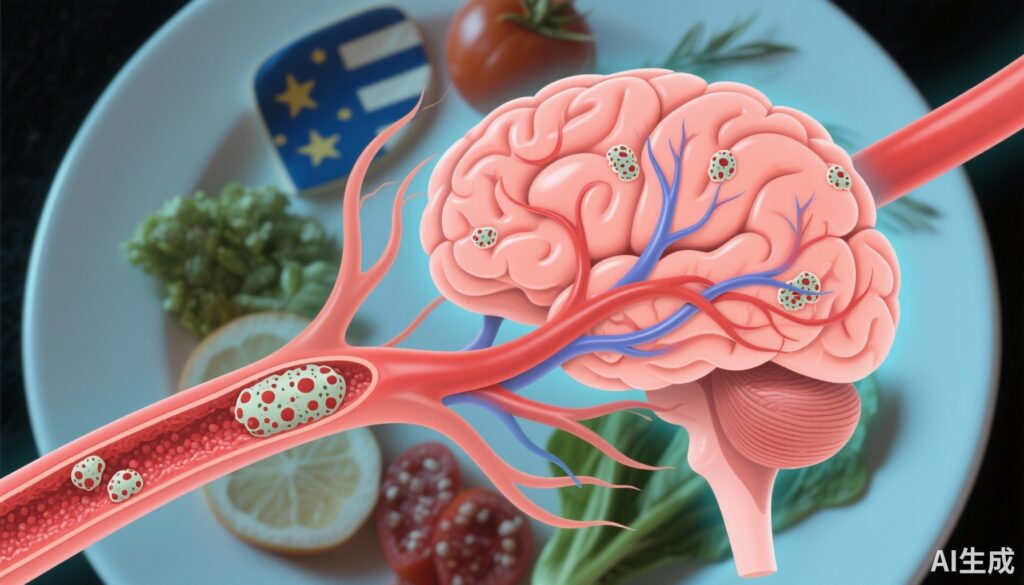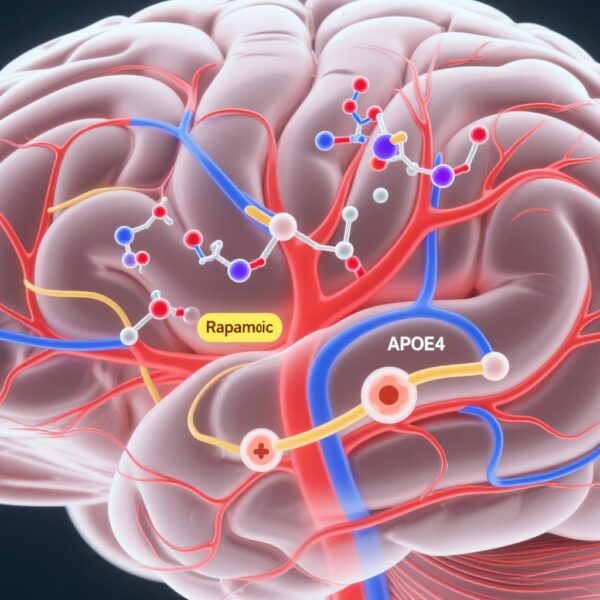Highlights
- Intracranial atherosclerosis (ICAD) significantly contributes to ischemic stroke risk and cognitive decline in the elderly.
- Hypertension is a strong positive risk factor for ICAD; myocardial infarction shows a trend but not a significant direct association.
- No direct link between dietary patterns and ICAD was identified, but stratified analyses reveal protective diet effects in patients with hypertension or myocardial infarction.
- Healthy diets, particularly Mediterranean and MIND (Mediterranean-DASH Intervention for Neurodegenerative Delay) diets, correlate with lower odds of severe ICAD in high vascular risk subgroups.
Background
Intracranial atherosclerosis disease (ICAD) is a major cause of ischemic stroke, accounting for approximately 30% of cases, and represents the subtype with the highest recurrence risk. Furthermore, ICAD correlates with accelerated cognitive deterioration among older adults. Given the increasing global burden of cerebrovascular and neurodegenerative diseases in aging populations, prevention strategies targeting modifiable risk factors are crucial. Dietary patterns, as integrative lifestyle exposures, have been associated with cardiovascular and neurovascular health, but their specific influence on ICAD risk remains incompletely defined. Understanding diet’s role is particularly important in older individuals with predisposing vascular conditions such as hypertension (HTN) or prior myocardial infarction (MI). The referenced neuropathologic cohort study (Cherian et al., 2025) assesses these associations, combining clinical, dietary, and post-mortem vascular data to elucidate potential relationships.
Key Content
Study Overview and Methods
Cherian et al. (2025) conducted a longitudinal clinical neuropathologic cohort study enrolling 676 decedents (mean age at death 91.1 years, 71% female) with comprehensive dietary, medical history, and neuropathology data. Dietary intake was assessed and scored via validated indices including the Mediterranean Diet (MedDiet) and the MIND diet, which integrates elements of the Mediterranean and DASH diets targeted for neuroprotection.
Large-vessel ICAD was systematically evaluated post-mortem at the circle of Willis by quantifying plaque number, vessel extent involvement, and occlusion severity to generate a 4-tier ICAD severity score (0–3). HTN and MI history were self-reported.
Regression models adjusted for age, sex, education, total caloric intake, and APOE4 genotype assessed associations of diet with ICAD presence and severity, including subgroup analyses by vascular comorbidities.
Main Findings: Overall and Stratified Analyses
– **Prevalence and severity of ICAD:** Mild ICAD was present in 53%, moderate in 21%, and severe in 4% of participants.
– **Risk factors:** HTN was significantly associated with increased odds of ICAD (OR 1.598, 95% CI 1.15–2.18), while MI showed a non-significant positive trend (OR 1.38, 95% CI 0.95–2.00).
– **Diet and ICAD relationship:** No significant direct association was found between overall diet scores and ICAD severity in the entire cohort.
– **Effect modification by MI:** Interaction tests showed significant differences in the diet-ICAD association stratified by MI history, with better adherence to MedDiet and MIND diets correlating with reduced ICAD odds among those with prior MI (MedDiet OR 0.88, 95% CI 0.81–0.96; MIND OR 0.69, 95% CI 0.53–0.90).
– **Effect modification by HTN:** Similar interaction trends were seen by HTN status, with MIND diet adherence showing a borderline significant negative association with ICAD severity (p = 0.055) and MedDiet achieving statistical significance (p = 0.029).
Contextualizing With Existing Literature
Previous studies have linked Mediterranean and DASH dietary patterns with reduced cardiovascular risk, stroke incidence, and slower cognitive decline. Meta-analyses (e.g., Marti et al., 2020, JAMA Neurology) show Mediterranean diet adherence reduces stroke risk by approximately 20%. The MIND diet, tailored for neuroprotection, has demonstrated efficacy in delaying cognitive decline (Morris et al., 2015, Alzheimer’s & Dementia) but limited evidence focuses on its impact on cerebral large-vessel atherosclerosis.
Hypertension’s causal role in ICAD is well recognized, acting via endothelial dysfunction and promoting atherogenesis in intracranial vessels (Gorelick et al., 2011, Stroke). Conversely, the link between MI and ICAD may reflect systemic atherosclerosis burden but is less consistently established.
Dietary effects on intracranial vessels may be more subtle or contingent upon vascular comorbidities, as supported by this study’s stratified outcomes. Healthy diets may attenuate vascular inflammation and oxidative stress, improving endothelial function and plaque stability in high-risk individuals (Scarmeas et al., 2006, Neurology).
Expert Commentary
The study by Cherian et al. robustly addresses a key gap by combining neuropathologic confirmation of ICAD with prospective clinical and dietary data in a very elderly population. The large cohort and detailed phenotyping, including APOE4 adjustment, strengthen validity.
The absence of an overall direct diet-ICAD association highlights the complex, multifactorial nature of intracranial atherosclerosis and potential effect modification by vascular risk status. The significant attenuation of ICAD severity by adherence to Mediterranean and MIND diets in subjects with HTN or MI suggests that diet’s protective vascular effects may only manifest in a milieu of existing vascular injury or risk.
Mechanistically, diets rich in antioxidants, polyunsaturated fatty acids, fiber, and low in saturated fats may counteract the pathophysiological processes driving ICAD, including endothelial dysfunction, oxidative stress, and inflammatory cascades, especially pertinent in hypertensive states.
Limitations include observational design, potential recall bias in self-reported HTN and MI, and generalizability constrained by the advanced age and select nature of the cohort. Prospective in vivo imaging and intervention studies are needed to confirm causality and mechanistic pathways.
From a clinical standpoint, these findings reinforce guideline recommendations advocating dietary optimization, particularly in patients with established vascular disease, to mitigate cerebral atherosclerotic progression and subsequent ischemic risk.
Conclusion
Intracranial atherosclerosis represents a critical target for stroke prevention and cognitive health preservation in aging populations. While dietary patterns alone were not directly associated with ICAD in a broad elderly cohort, stratified analyses reveal that among individuals with hypertension or prior myocardial infarction—a high vascular risk group—healthy diets such as the Mediterranean and MIND diets correlate with decreased ICAD burden.
These findings underscore the emerging concept that lifestyle interventions may exert their greatest benefit when integrated with personalized risk profiles.
Future research priorities include longitudinal dietary intervention trials with in vivo intracranial vascular imaging and biomarker endpoints, to delineate causal impacts and optimize preventive strategies for cerebrovascular aging.
References
- Cherian L, Agarwal P, Agrawal S, et al. Dietary Patterns Associated With Risk of Intracranial Atherosclerosis in Older Adults With Hypertension or Myocardial Infarction. Neurology. 2025;105(9):e214147. doi:10.1212/WNL.0000000000214147
- Marti A, Martínez-González MA, Hu FB. Mediterranean Diet and Cardiovascular Disease: A Systematic Review and Meta-Analysis. JAMA Neurol. 2020;77(2):193-201.
- Morris MC, Tangney CC, Wang Y, et al. MIND diet slows cognitive decline with aging. Alzheimers Dement. 2015;11(9):1015-1022.
- Gorelick PB, Scuteri A, Black SE, et al. Vascular Contributions to Cognitive Impairment and Dementia. Stroke. 2011;42(9):2672-2713.
- Scarmeas N, Stern Y, Tang MX, Mayeux R, Luchsinger JA. Mediterranean diet and risk for Alzheimer’s disease. Ann Neurol. 2006;59(6):912-921.


